| Srl | Item |
| 1 |
ID:
101762
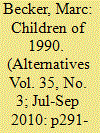

|
|
|
|
|
| Publication |
2010.
|
| Summary/Abstract |
In June 1990, the Confederation of Indigenous Nationalities of Ecuador (CONAIE) led a massive uprising against their social, economic, and political marginalization. The protest altered the political landscape of Ecuador and gave that country a reputation as home to some of the strongest and best-organized social movements in South America. Two decades later-this year, 2010-the children of the leaders of that historic uprising continued to lead mobilizations against the government. This time, however, Rafael Correa, whom many saw as emblematic of Latin America's shift to the left, was in power. What explains indigenous protest against a leftist government? Was Correa not a true leftist, as some militants alleged? Or was this yet another example of a white urban left failing to take the concerns of rural indigenous communities into account? Recent developments point to an alternative explanation: Indigenous movements have become more conservative and have discarded a strategy of building coalitions that had brought them so much success in the twentieth century.
|
|
|
|
|
|
|
|
|
|
|
|
|
|
|
|
| 2 |
ID:
186939
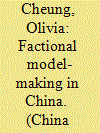

|
|
|
|
|
| Summary/Abstract |
This article introduces the analytical framework of “factional model-making” to describe and explain the open political contention of Chinese Communist Party elites in the policy process. Party elites undertake factional model-making to express policy disagreements and to signal their power to the regime: by flouting the Party line publicly without punishment, they show that they can influence the Party line and therefore pressurize the regime into acknowledging their position in the opaque power structure. This article chronicles the history of factional model-making from the 1960s to 2012 and examines in detail the making of Henan's Nanjie Village into a re-collectivization model by the Party's left. The process began in the 1990s and ended soon after Xi Jinping came to power in 2012, which prompted Nanjie's patrons to recast the village as a Party model trumpeting Xi's line. The suppression of factional model-making under Xi is discussed in the conclusion.
|
|
|
|
|
|
|
|
|
|
|
|
|
|
|
|
| 3 |
ID:
171190
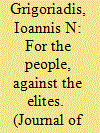

|
|
|
|
|
| Summary/Abstract |
While the rise of populism has been a global trend in recent years, it has been prevalent in Greece and Turkey for longer, leaving a strong imprint on the politics of both countries. Left-wing populism has become one of the constitutive elements of the Greek political party system since the collapse of the 1967–1974 military regime. The 2009 outbreak of the Greek economic crisis set the stage for the radicalization of Greek politics through the rise of extremist far-right and far-left populist parties that professed populist agendas of different hues. Such populists accused old-party personnel of being members of a “treacherous elite” that sacrificed Greek national interests against foreign powers. The 2011 “indignados” movement is key for the better understanding of the social dynamics that facilitated the rise of the unusual SYRIZA-ANEL coalition government. Debates on Greek constitutional reform also highlighted the relevance of populism, especially as the SYRIZA-ANEL government sought topics to resonate with its disenchanted voters. On the other hand, a right-wing populist rhetoric has been one of the key instruments for the rise of Turkish political Islam and the establishment of the AKP hegemony in Turkey. Establishing a Kulturkampf-based narrative about the “secularist, ‘white-Turk’ elites” versus the “conservative, ‘black-Turk’ people” was of great political significance. The constitutional reform process proved again crucial for manifesting the relevance of populism in Turkish political discourse. This article explores the circumstances under which left- and right-wing populism have emerged into a dominant feature of Greek and Turkish politics. It also discusses the decreasing relevance of the established left-right political divide in party politics and suggests alternative classifications.
|
|
|
|
|
|
|
|
|
|
|
|
|
|
|
|
| 4 |
ID:
121428
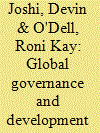

|
|
|
|
|
| Publication |
2013.
|
| Summary/Abstract |
This article compares the development ideologies of the United Nations and the World Bank by placing them on the left-right spectrum. It reviews previous ideological assessments of the two organizations and applies qualitative and quantitative content analysis of annual World Development Reports published by the World Bank and Human Development Reports issued by the United Nations Development Programme to examine their development discourse. Analysis of fifty-seven reports from 1978 to 2011 reveals two major findings. First, the World Development Reports have continuously articulated a development discourse to the right of the Human Development Reports. Second, there is clear evidence of convergence in the reports over time toward the political center.
|
|
|
|
|
|
|
|
|
|
|
|
|
|
|
|
| 5 |
ID:
123216
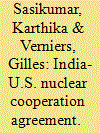

|
|
|
|
|
| Publication |
2013.
|
| Summary/Abstract |
The U.S.-India civil nuclear energy agreement triggered a contentious debate in India from 2005 to 2008. Regional political actors played crucial and unanticipated roles in the debate. We present explanations for the positions adopted by the main actors and the level of contention. We find that parties' positions were driven not by ideology but by the compulsions of coalition politics.
|
|
|
|
|
|
|
|
|
|
|
|
|
|
|
|
| 6 |
ID:
095137
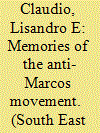

|
|
|
|
|
| Publication |
2010.
|
| Summary/Abstract |
The Bantayog ng mga Bayani [Monument of Heroes] is a memorial centre in Manila dedicated to the memory of individuals who resisted the dictatorship of the late President Ferdinand E. Marcos. This article examines history as represented in this memorial centre. Through an examination of its museum and the debates concerning whom the Bantayog should honour as heroes, it analyses a key historical tension in the representation of the Marcos period: an ambivalence regarding the anti-dictatorship struggle of the organized Left. It also examines the class-based nature of historical memory in the Philippines, arguing that class positions inform who and what is remembered.
|
|
|
|
|
|
|
|
|
|
|
|
|
|
|
|
| 7 |
ID:
146417
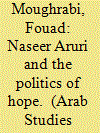

|
|
|
|
|
| Summary/Abstract |
A comparative approach is necessary when examining the role of Palestinian scholars and activists in defense of their cause. A look at the role of Native American scholars and activists reveals some similarities. Both groups worked hard to prevent the erasure of their identity by the settler colonial invaders. Another common theme is the emphasis on a politics of hope. Professor Aruri was a man of the left which has been in retreat throughout the Arab World. A renewed critique is necessary before the left can be resurrected. This offers the only democratic hope for the region.
|
|
|
|
|
|
|
|
|
|
|
|
|
|
|
|
| 8 |
ID:
117495


|
|
|
|
|
| Publication |
2012.
|
| Summary/Abstract |
Barack Obama's election as US president gave rise to hopes of radical reform. Indeed, comparisons were drawn with 1932 and there were references to 'realignment'. Many on the left were quickly disappointed by the limited character of the American Recovery and Reinvestment Act, the abandonment of proposed reforms, and the concessions that were made to ensure the passage of healthcare legislation. Some explained these failures through agency-based accounts and pointed to what they saw as personal weakness. Others stressed the structural constraints imposed by the asymmetric character of partisan polarisation, the political weight of capital, and the institutional character of the American state. The article argues that the character of the 'Obama coalition' should also be considered. It has been relatively narrow particularly when compared with the 'Roosevelt coalition'. In particular, it failed to draw business fractions into its ranks.
|
|
|
|
|
|
|
|
|
|
|
|
|
|
|
|
| 9 |
ID:
176083
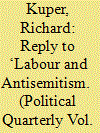

|
|
|
|
|
| Summary/Abstract |
In their 2020 Political Quarterly article ‘Labour and antisemitism: a crisis misunderstood’, Gidley, McGeever and Feldman argue that the Labour Party’s responses to its antisemitism crisis have been misguided because its understanding of antisemitism is wrong. We must look less at cases of individual antisemites and more at the ‘reservoir of stereotypes and narratives’, in which the long (but unacknowledged) history of left antisemitism has deposited its ideas—and from which they can be easily retrieved.
|
|
|
|
|
|
|
|
|
|
|
|
|
|
|
|
| 10 |
ID:
165602
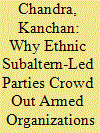

|
|
|
|
|
| Summary/Abstract |
This article asks why some Indian districts experience chronic Maoist violence while others do not. The answer helps to explain India’s Maoist civil war, which is the product of the accumulation of violence in a few districts, as well as to generate a new hypothesis about the causes of civil war more generally. The authors argue that, other things equal, the emergence of subaltern-led parties at the critical juncture before armed organizations enter crowds them out: the stronger the presence of subaltern-led political parties in a district at this juncture, the lower the likelihood of experiencing chronic armed violence subsequently. They develop their argument through field research and test its main prediction using an original, district-level data set on subaltern incorporation and Maoist violence in India between 1967 and 2008. The article contributes a new, party-based explanation to the literatures on both civil war and Maoist violence in India. It also introduces new district-level data on the Maoist movement and on the incorporation of subaltern ethnic groups by political parties in India.
|
|
|
|
|
|
|
|
|
|
|
|
|
|
|
|